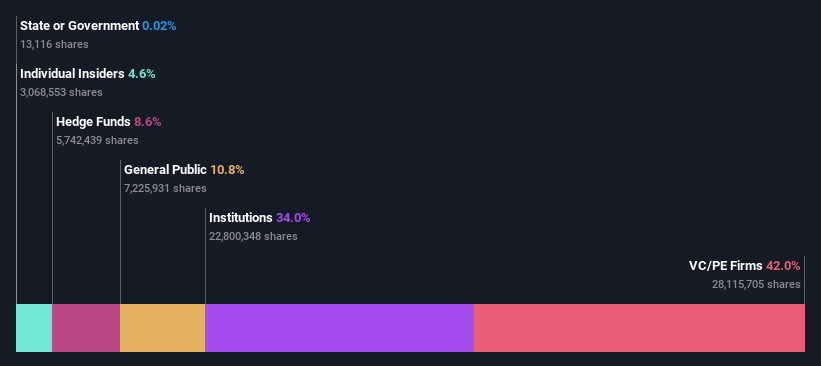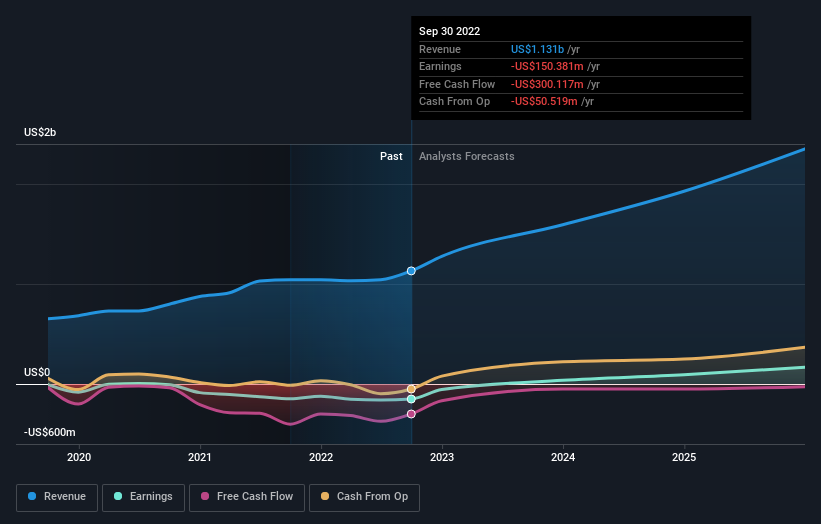Enviva Inc.'s (NYSE:EVA) market cap dropped US$129m last week; individual investors who hold 42% were hit as were institutions
A look at the shareholders of Enviva Inc. (NYSE:EVA) can tell us which group is most powerful. And the group that holds the biggest piece of the pie are private equity firms with 42% ownership. In other words, the group stands to gain the most (or lose the most) from their investment into the company.
While institutions, who own 34% shares weren’t spared from last week’s US$129m market cap drop, private equity firms as a group suffered the maximum losses
In the chart below, we zoom in on the different ownership groups of Enviva.
See our latest analysis for Enviva
What Does The Institutional Ownership Tell Us About Enviva?
Institutions typically measure themselves against a benchmark when reporting to their own investors, so they often become more enthusiastic about a stock once it's included in a major index. We would expect most companies to have some institutions on the register, especially if they are growing.
As you can see, institutional investors have a fair amount of stake in Enviva. This suggests some credibility amongst professional investors. But we can't rely on that fact alone since institutions make bad investments sometimes, just like everyone does. If multiple institutions change their view on a stock at the same time, you could see the share price drop fast. It's therefore worth looking at Enviva's earnings history below. Of course, the future is what really matters.
It would appear that 8.6% of Enviva shares are controlled by hedge funds. That catches my attention because hedge funds sometimes try to influence management, or bring about changes that will create near term value for shareholders. Riverstone Holdings LLC is currently the largest shareholder, with 42% of shares outstanding. Inclusive Capital Partners, L.P. is the second largest shareholder owning 8.6% of common stock, and Capital Research and Management Company holds about 5.2% of the company stock. In addition, we found that Thomas Meth, the CEO has 0.6% of the shares allocated to their name.
A more detailed study of the shareholder registry showed us that 2 of the top shareholders have a considerable amount of ownership in the company, via their 51% stake.
Researching institutional ownership is a good way to gauge and filter a stock's expected performance. The same can be achieved by studying analyst sentiments. Quite a few analysts cover the stock, so you could look into forecast growth quite easily.
Insider Ownership Of Enviva
The definition of an insider can differ slightly between different countries, but members of the board of directors always count. Company management run the business, but the CEO will answer to the board, even if he or she is a member of it.
Insider ownership is positive when it signals leadership are thinking like the true owners of the company. However, high insider ownership can also give immense power to a small group within the company. This can be negative in some circumstances.
Our most recent data indicates that insiders own some shares in Enviva Inc.. This is a big company, so it is good to see this level of alignment. Insiders own US$148m worth of shares (at current prices). It is good to see this level of investment by insiders. You can check here to see if those insiders have been buying recently.
General Public Ownership
The general public-- including retail investors -- own 11% stake in the company, and hence can't easily be ignored. This size of ownership, while considerable, may not be enough to change company policy if the decision is not in sync with other large shareholders.
Private Equity Ownership
With a stake of 42%, private equity firms could influence the Enviva board. Sometimes we see private equity stick around for the long term, but generally speaking they have a shorter investment horizon and -- as the name suggests -- don't invest in public companies much. After some time they may look to sell and redeploy capital elsewhere.
Next Steps:
It's always worth thinking about the different groups who own shares in a company. But to understand Enviva better, we need to consider many other factors. Like risks, for instance. Every company has them, and we've spotted 4 warning signs for Enviva (of which 2 are a bit concerning!) you should know about.
If you are like me, you may want to think about whether this company will grow or shrink. Luckily, you can check this free report showing analyst forecasts for its future.
NB: Figures in this article are calculated using data from the last twelve months, which refer to the 12-month period ending on the last date of the month the financial statement is dated. This may not be consistent with full year annual report figures.
Have feedback on this article? Concerned about the content? Get in touch with us directly. Alternatively, email editorial-team (at) simplywallst.com.
This article by Simply Wall St is general in nature. We provide commentary based on historical data and analyst forecasts only using an unbiased methodology and our articles are not intended to be financial advice. It does not constitute a recommendation to buy or sell any stock, and does not take account of your objectives, or your financial situation. We aim to bring you long-term focused analysis driven by fundamental data. Note that our analysis may not factor in the latest price-sensitive company announcements or qualitative material. Simply Wall St has no position in any stocks mentioned.
Join A Paid User Research Session
You’ll receive a US$30 Amazon Gift card for 1 hour of your time while helping us build better investing tools for the individual investors like yourself. Sign up here


